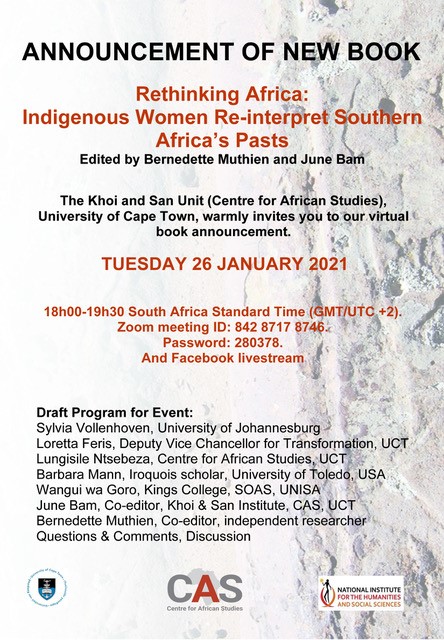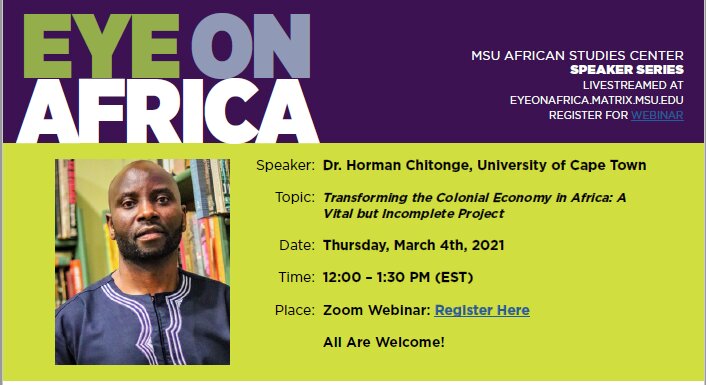
The book, funded by the NIHSS, is now available for pre-order via Jacana Media.
About the Book:
This book critically opens new pathways for de-colonial scholarship and the reclamation of indigenous self-definition by women scholars. Indigenous peoples around the world are often socially and gender egalitarian, matricentric, matrifocal, matrilineal, less violent, beyond-heteronormative, ecologically sensitive, with feminine or two-gender deities or spirits, and more. Several studies have been published internationally about various such indigenous societies on all continents, with individual authors or as collections of authors. Muthien has contributed to several of these publications over many years and Bam has made numerous key contributions in the field of rethinking and rewriting the African past more generally. Only this century have mainstream publishers begun publishing indigenous men on the southern African past with their particular phallogocentrism (male centredness), often ignoring the conditions and contributions of indigenous women through history. Thus it is long overdue that as indigenous women we write our own herstory, define our own contemporary cultural and socio-economic conditions, and ideate future visions based on our lived realities, which are socially and gender egalitarian, matricentric, beyond-heteronormative, based on nonviolence or peace, ecologically responsible, and goddess-loving (for those fond of indigenous deities or spirits). All chapters herstoricise the accepted ‘histories’ and theories of how we came to understand the African past in the way that we do, how to problematise and rethink that discourse, and provide new and different ‘herstorical’ lenses, philosophies, epistemologies, methodologies and interpretations. It is the first of its kind in Africa and the world, a book written by, with and for indigenous southern African women from matricentric societies. We hope it will be a widely sought-after reference locally and abroad, now and for generations to still come.
Book Contents:
Poem: I’ve come to take you home – A tribute to Sarah Baartman - Diana Ferrus
Foreword: Lungisile Ntsebeza
Introduction: June Bam and Bernedette Muthien
Chapter 1: Writing ourselves back into history: The liberating narrative of who we are - Sylvia Vollenhoven
Chapter 2: Rematriation: Reclaiming indigenous matricentric egalitarianism - Bernedette Muthien
Poem: green kalahari - Bernedette Muthien
Chapter 3: Gendering social science: Ukubuyiswa of maternal legacies of knowledge in sociology, South Africa - Babalwa Magoqwana
Chapter 4: Feminism-cide and epistemicide of Cape herstoriography - June Bam
Poem: The bones - Diana Ferrus
Poem: Camissa – Khadija Tracey Carmelita Heeger
Poem: call to art - Shelley Barry
Chapter 5: Pandemics past and present, valuing the increased and invisible workload of indigenous women – Sharon Groenmeyer
Chapter 6: Decolonising the representation of indigenous women at the Cape during Covid-19 - June Bam and Robyn Humphreys
Chapter 7. Repositioning !Uiki Ilnaosa/aia/!uiki - Gertrude Fester-Wicomb
Chapter 8: Ancestral letter to unborn descendants - Sarah Henkeman
Chapter 9: The falling sky: Some notes about originary peoples in Brazil - Ana Lígia Leite e Aguiar
Poem: one & many - Bernedette Muthien
Conclusion: June Bam and Bernedette Muthien

ABOUT THE SPEAKER
Horman Chitonge is a professor and head of African Studies at the University of Cape Town (UCT). He is a research fellow at the Global Justice Programme, Yale University, a research associate at PRISM, School of Economics (UCT), and a visiting fellow at the African Studies Centre, Tokyo University of Foreign Studies. His research interests include agrarian political economy, hydro-politics, and alternative strategies for economic growth in Africa. His most recent books include: Industrial Policy and the Transformation of the Colonial Economy in Africa: The Zambian Experience (Routledge, 2021). Industrialising Africa: Unlocking the Economic Potential of the Continent ( Peter Lang, 2019); Social Welfare Policy in South Africa: From the Poor White Problem to a Digitised Social Contract (Peter Lang, 2018). ABOUT THE TALK Most African economies we have today were established during colonial rule for very specific reasons. Although there is debate about the motive behind the creation of the colonial economy in Africa, one thing that is clear is that economic activities conducted on the continent were not intended to benefit Africans primarily. The structure and logic of the colonial economy in Africa clearly show that the primary intention of economic activities conducted on the African continent during colonial rule was to benefit European Settlers and European owners of businesses in Africa. If the colonial economy in African was created not to primarily benefit Africans on the continent, post-colonial Africa should seek to reorganize the colonial economy so that economic activities taking place in Africa are oriented towards benefiting Africans. Yet, six decades after many African countries started to celebrate the end of colonial rule, most (if not all) economies on the continent have surprisingly continued to operate under the colonial economic structure and logic. The structure of production in most countries, for instance, has remained overwhelmingly oriented towards the production of raw materials and semi-processed commodities as was the case during colonial times. In this paper, I argue that the transformation of African economies is a central pillar of the project of decolonising the continent which started during the late 1950s. However, this project remains incomplete, if not, abandoned today, leading to a situation where the colonial economy is very much alive in all African countries 60 years after the end of colonial occupation. The purpose of this paper is to illustrate that the colonial economy has survived six decades of self-rule in Africa and that the failure to transform the colonial economy has blocked the other aspects of decolonisation in Africa. I argue in this paper that African governments can use industrial policy as an instrument for transforming the colonial economy.
ABOUT THE TALK
Most African economies we have today were established during colonial rule for very specific reasons. Although there is debate about the motive behind the creation of the colonial economy in Africa, one thing that is clear is that economic activities conducted on the continent were not intended to benefit Africans primarily. The structure and logic of the colonial economy in Africa clearly show that the primary intention of economic activities conducted on the African continent during colonial rule was to benefit European Settlers and European owners of businesses in Africa. If the colonial economy in African was created not to primarily benefit Africans on the continent, post-colonial Africa should seek to reorganize the colonial economy so that economic activities taking place in Africa are oriented towards benefiting Africans. Yet, six decades after many African countries started to celebrate the end of colonial rule, most (if not all) economies on the continent have surprisingly continued to operate under the colonial economic structure and logic. The structure of production in most countries, for instance, has remained overwhelmingly oriented towards the production of raw materials and semi-processed commodities as was the case during colonial times. In this paper, I argue that the transformation of African economies is a central pillar of the project of decolonising the continent which started during the late 1950s. However, this project remains incomplete, if not, abandoned today, leading to a situation where the colonial economy is very much alive in all African countries 60 years after the end of colonial occupation. The purpose of this paper is to illustrate that the colonial economy has survived six decades of self-rule in Africa and that the failure to transform the colonial economy has blocked the other aspects of decolonisation in Africa. I argue in this paper that African governments can use industrial policy as an instrument for transforming the colonial economy.
*To register for the event see the link below:
https://cvip.isp.msu.edu/cvip/events/?id=521
